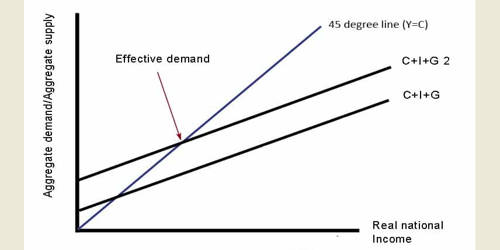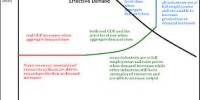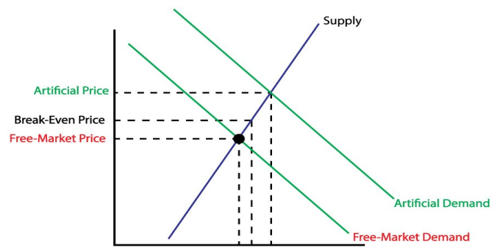Effective demand refers to the willingness and ability of consumers to purchase goods at different prices. In economics, effective demand (ED) in a market is the demand for a product or service which occurs when purchasers are constrained in a different market. It is the level of demand that represents a real intention to purchase by people with the means to pay. It is judged by the total expenditure in the economy. It shows the number of goods that consumers are actually buying – supported by their ability to pay. The principle of ‘effective demand’ is basic to Keynes’ analysis of income, output, and employment. In Keynes’s macroeconomic theory, effective demand is the point of equilibrium where aggregate demand = aggregate supply. It is a reflection of the extent to which buyers’ income, perceptions, and needs combine to result in an actual purchase rather than a mere desire to purchase.
Factors affecting effective demand – The main factors affecting ‘effective demand’ will be
- Price,
- Income – a rise in income will tend to cause rising demand,
- Availability of credit – If consumers and firms are able to borrow, then they have an effective demand to buy or invest.
- Time also plays a very important role to change the demand, for example, during the time, the people in the country will need the goods, so the demand has increased even the price of that commodity is increased.
Effective demand manifests itself in the spending of income. It shows the number of goods that consumers are actually buying. It contrasts with notional demand, which is the demand that occurs when purchasers are not constrained in any other market. In the aggregated market for goods in general, demand, notional or effective, is referred to as aggregate demand. In any community, effective demand represents the money actually spent by- people on goods and services. The concept of effective supply parallels the concept of effective demand. The concept of effective demand or supply becomes relevant when markets do not continuously maintain equilibrium prices. It also represents the value of the output of the community because the total value of the national output is just the same thing as the receipts of the entrepreneurs from selling goods. Example: Students who have sufficient income or wealthy parents can effectively demand university education. Students with no parental backing may not have an effective demand to study at university.
Thus, effective demand (ED) = national income (Y) = value of national output = Expenditure on consumption goods (C) + expenditure on investment goods (I).
Therefore, ED = Y = C + I= 0 = Employment.
















